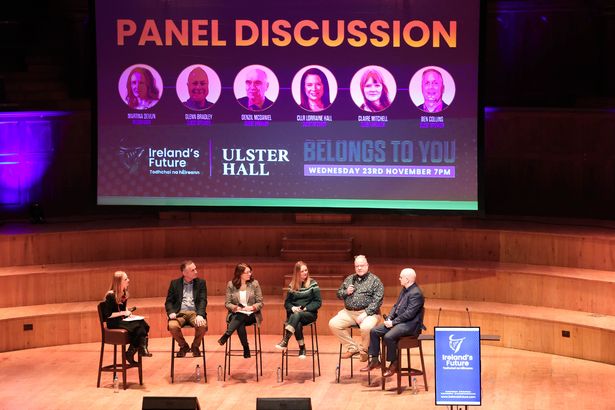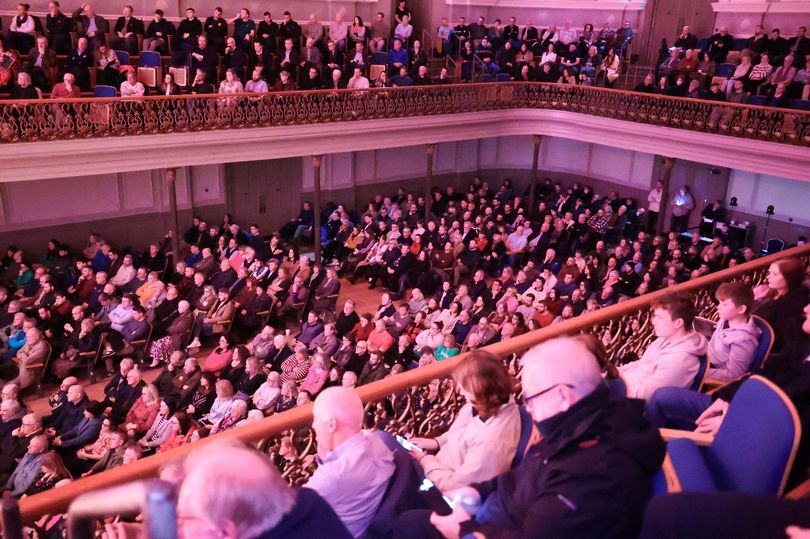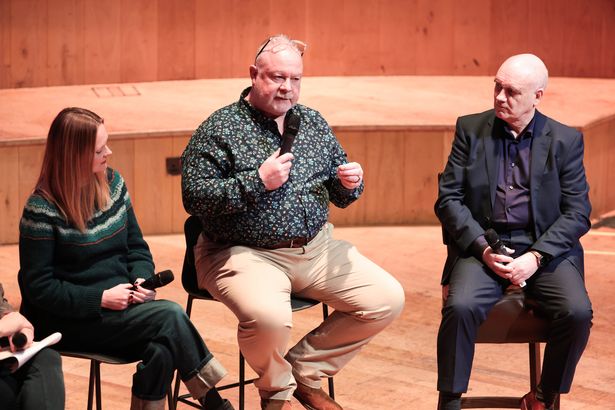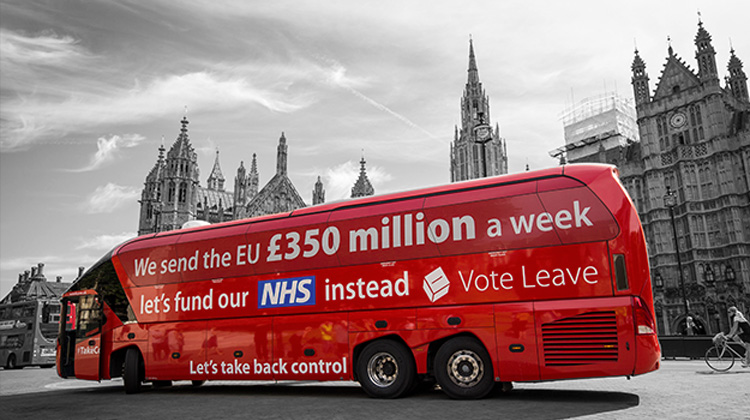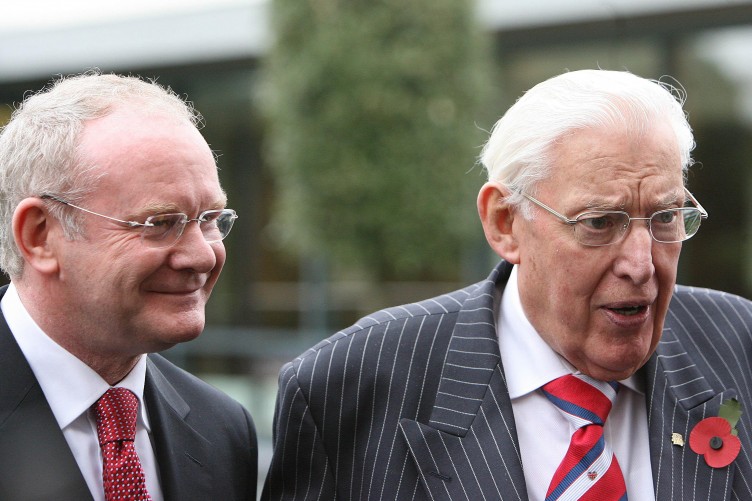Former British soldier and member of the Ulster Unionist Party in 1998, Glenn Bradley, recently spoke at the Ireland’s Future event in the Ulster Hall and was later vilified on social media by some loyalists. Here, he links the debate about fundamental constitutional change to the DUP’s disastrous support for a hard Brexit and also outlines his evolving political thinking.
Danny Morrison and I were once on very opposing sides. Through politics we became acquaintances and after time that developed to a trusted friendship. Such things happen in life and there are examples across the history of time where former foes become friends when conflict ends.
However, for readers that don’t know me, I was born 1967 in loyalist west Belfast, 32 Ainsworth Drive to be specific. Post a successful career in international business I retired early. An ethical trade pioneer I built a reputation for a no-nonsense approach to resolving worker rights and social justice issues in global corporate supply chains improving efficiency and raising standards. I also held various public appointments notably as a Trustee of the Community Foundation NI, a Director of Inter Action and most recently as the Chair of the Northern Ireland Business and Human Rights Forum. I am a chartered member of the Institute of Directors (Ireland) and the Institute of Purchasing and Supply.
I am also known as a former British soldier who post-1994 was an Ulster Unionist Party Officer involved in the talks process that delivered the Belfast (Good Friday) Agreement. I left party politics in 2000 though have continuously engaged with various initiatives to advance peace, reconciliation and evolve political thinking.
I’ve been in the news of late post my participation as a panellist at Ireland’s Future recent gathering in the Ulster Hall on 23 November.
I am comfortable about my engagement and what I said. Since attending, I have taken some unwarranted, unnecessary and inaccurate critique. Unwarranted because I am a democrat and all who call themselves ‘democrats’ believe in the fundamental right of anyone to debate, lobby and pursue their legitimate political or constitutional aspirations via peaceful and democratic means. Unnecessary and inaccurate because the toxicity has been largely deceitful, body shaming or simply fanciful none of it addressed the topics I raised
So let me outline again the points I made and my position on constitutional change.
I desire a democratically elected government whose parliament is here with our people; one that is fiscally responsible, capable of delivering via transparent processes for the well-being of the population, in an equal equitable way, and is committed to improving quality of life.
What is wrong with wanting authentic democratic empowerment for my family? For future generations, particularly when (so obviously, when) Westminster cannot deliver the same?
I have long held the view that the First Past The Post (FPTP) system in the UK is antiquated, and was created to ensure the establishment in England and Wales. Seats in Parliament do not match or reflect the votes cast and the idea of a minority ruling over the majority goes against the most basic ideas about democracy. Single-party majority governments are not normal – only the Belarus and UK have this form of electoral system across modern Europe. It is a fact that since 1935 in the UK not one government has held the support of a majority of voters and that, for me, is an affront to modern diversity and political discourse. Within the FPTP system the UK is not a unitary state.
Add to this my really big problem with the House of Lords – too old, marred by hereditary peers and stuffed with political party acolytes. It is second in size only to the Chinese upper house (that serves 1.4+ billion people) and is, frankly, a pig trough/gravy chain for the majority in it.
Despite having contributed to the UK exchequer for over thirty-nine years of continuous working life and despite being someone who created business with gainful employment for others, despite holding a UK passport all my days and representing British-Irish business overseas, and despite having served the Crown, it is a reality that in 2022, as a Belfast man, there is absolutely nought I can do to change the very undemocratic systems at Westminster.
Why? Because despite all the talk of reform that has taken place at various junctures throughout my life the privileged and the elite, who wallow in power via such undemocratic systems, do not want it to change.
Today, if there is any pro-Union person out there who believes Westminster can be reformed via specific, measurable, achievable, relevant and time-bound goals that will provide democratic empowerment for the population of Northern Ireland then I welcome reading your proposal!
The concerns set out plagued me my whole adult life – giving loyalty to a system that was so utterly flawed and imbalanced. As a soldier my oath was to Her Majesty Queen Elizabeth II but it was successive British governments that sent me on operations, operations that most times were terribly flawed in mission statement, and the democratic deficit that placed them in power to do that dogged me.
Then in 2016, BREXIT happened. This was followed by the Tory Party with its DUP lap dogs pursuing a BREXIT that was not on the referendum cards in 2016. There was corruption involved and the perpetrators were/are delusional, for withdrawal has not improved the UK’s position in the global economy. Far from it. The 12 lies of BREXIT are long established so I won’t waste readers’ time going over those. Safe to state that at the time many of us warned on the implausibility of these outright deceits only to face hostile ridicule from right-wing elements that included fascists and their applauders.
However, reducing the UK and its economy to the status of a 3rd nation outside the Single Market (SM) and Customs Unions (CU), reducing peoples’ rights and delivering irreversible damage to the UK economy, was the greater fantasy to play out in the bid to ‘get BREXIT done’. As a direct result of this type of BREXIT and because Northern Ireland is the only region of the UK with a land border with another EU state (the Republic of Ireland) the trade agreement clause that has become known as ‘The Protocol’ came into being. I emphasise, the trade agreement and subsequent protocol are an outworking of the type of BREXIT the Tories and DUP pursued. No one else is to blame.
It is a fact that for decades, and since the creation of Northern Ireland, there has been trade divergence on the Irish Sea. There has always been bureaucracy for certain commodities crossing from Britain to these shores and vice versa. There has never been a flawless unitary state in trade and that is a verifiable fact. If we add to that the reality that Rights, Licensing Laws and many other rules, conditions, applications have been different here to Britain, oft subverted by political parties here, the precedent has always been that Northern Ireland has never been in a faultless unitary state.
For me, BREXIT demonstrated the inequality of the UK’s small nations. Reared in a loyal-Irish family, I had always been told I was the Irish contingent to that Kingdom made of Scots, Welsh, English and us. That Saint Patrick’s saltire on the Union flag was us, and that the union was best because it treated us equally.
For me, BREXIT proved all that to be a lie.
Had all of Northern Ireland’s electorate voted to REMAIN we would have still been dragged out by the sheer voting weight of the English electorate. Northern Ireland and Scotland have been forcibly taken out of the EU by a right-wing coup led by the Tory European Research Group (ERG) and the DUP. An ERG, within a Tory party, that is only in power because of the deficient FPTP system. This is not a Union of equal, small nations, but a union of subjugation to English nationalism currently fuelled by a minority of fascists forcing upon the public a seriously flawed ideology, damaging to politics and the economy.
BREXIT killed in me any notion of a Union of Equals and made me arrive at the conclusion that I was never in a unitary state.
As I write, the UK Prime Minister Rishi Sunak is visiting Belfast and the Protocol is on the news. The Tories and the DUP are sidestepping, always sidestepping responsibility for creating the mess. Don’t get me wrong, the protocol is flawed: it was a rush job ‘to get BREXIT done’ and is littered with anomalies that civil servants penned in theory but which do not work in practice. These do need resolved. However, such resolution is for agreement between the UK government and the EU. The issues are wholly resolvable if there is the political will, grace and a sustainable operational plan for practice because trade divergence will continue, and as I said before, divergence is part of the apparatus of this small place which has never, ever been part of an unblemished unitary kingdom.
With my pure commercial business head on, I would add that the Protocol provides Northern Ireland with a unique trading ability that if seized upon properly will attract investment, providing gainful employment opportunities. This will become blatantly obvious as analyses of trade become more prevalent under operational practice.
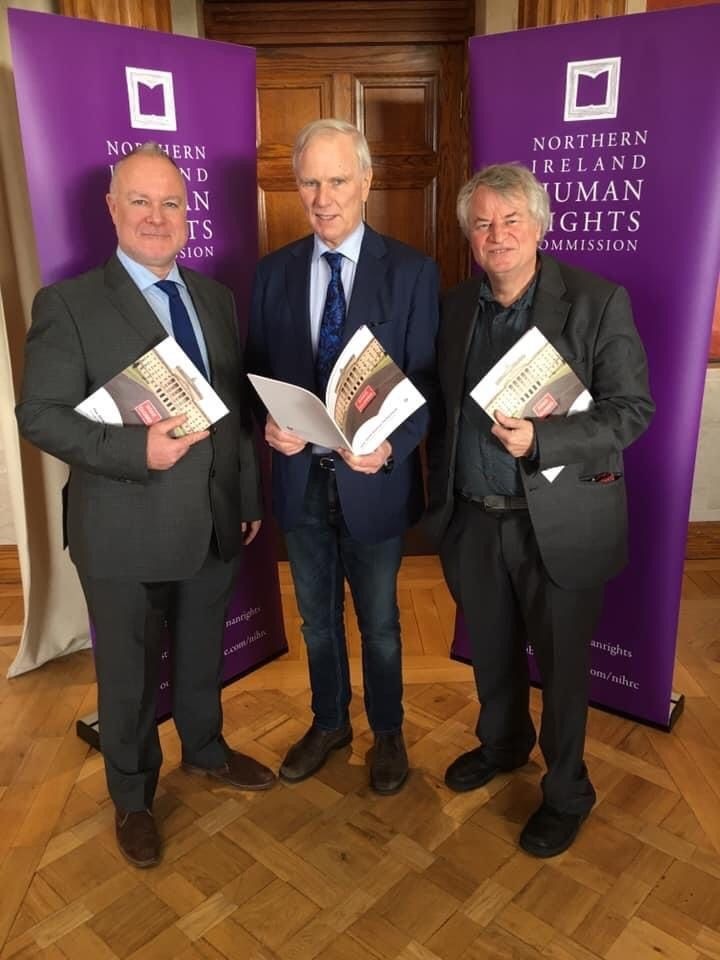
Glenn Bradley with Philip Alston UN Special Rapporteur on Human Rights & Extreme Poverty and Les Allamby Chief Commissioner of the NIHRC in 2020.
THE DUP
That leaves me looking, again, at the DUP and trying to fathom what they are doing and why, particularly given the cost of living crisis we are all experiencing. The DUP leader Jeffrey Donaldson never wanted to be First Minister or Deputy First Minister. I am actually not even certain he wanted the DUP leadership: it is not what James Molyneaux or Enoch Powell groomed him for. However, Ian Paisley Snr did—thankfully—covet that office and it was what drove the DUP to embrace the power-sharing it formerly opposed.
The brilliantly pragmatic Peter Robinson went along with it, succeeding Paisley and I believe both men were capable of putting the greater good of the population in Northern Ireland first. Ian and Peter unfortunately left office too soon in my opinion, and that brought us Arlene Foster, who demonstrated she could not lead for the greater good of all in the population. We then briefly had Edwin Poots, whose election sent shock waves through the NIO and Westminster so there was another change that delivered us Jeffrey, on a second attempt.
We, the population of Northern Ireland, are facing the most vehement anti-Good Friday Agreement dissenter as leader of what is now an openly anti-Good Friday Agreement Party. Its courting of right-wing elements means the tail is wagging dog. Many of the older guard of the DUP have been elevated to the House of Lords and simply don’t care about here enough. The Protocol has become the pretext to refuse to return to the executive but I strongly suspect that the actual reason is a refusal or reluctance to serve under a Sinn Féin First Minister (even though it is a joint-office). It is the only explanation for the DUP treating the population, particularly the vulnerable working-class, so cruelly. It’s as if a scorched-earth policy has been adopted in the worst cost of living crisis in seventy years. But it also illustrates how broken, how utterly broken are the structures. I don’t see anyone in politics adopting true leadership roles.
We live, all of us, under a system with a democratic deficit and no opportunity of reform. Democratic debate is stifled. Meanwhile, right-wing ideologues foment symbolism and pageantry as being more important than citizens’ quality of life—and that makes me think further back.
In 1912 my great grandparents signed the Ulster Covenant. Back then the north-east counties of Ireland where the richest part of the island with 70% of Ireland’s industrial production. I can easily understand why so many, including my ancestors, signed the Covenant believing that Home Rule would be ‘disastrous to the material well-being of Ulster’ and ‘our cherished position of equal citizenship’.
Today, 110 years later, these north-east counties, named Northern Ireland post-partition, are the poorest region of the UK, and on the island of Ireland. Northern Ireland registers the worst scale indicators for average income, disposable income, health. I could go on. In addition, civil liberties and rights equality referred in the Covenant are denied. Like, how can you honestly do that—that is, beat the chest, march to the drum lauding your ancestors and your version of ‘Britishness’ one day, only on the next day to deny your fellow citizens equalities freely given in England, Scotland, Wales? It’s as if the unitary state only counts if some will let it.
As a democrat, all I see is supremacist thinking and modelling, and it has become institutionalised in Northern Ireland. It was also institutionalised in the southern Irish state. The partition imposed, at a time when the British Empire was battling against rising internal threat, has been an utter calamity. It created two little bastard states: one created beholden to religious rights, the other to marching rights, but neither for the rights of citizens’ well-being. A Labour or new Tory government or even a Coalition government in Westminster will not deliver democratic empowerment for us here—ever.
I ask myself when is enough, enough?
I have held genuine feelings towards Britain and I don’t doubt that Britain once held similar sentiment for here. I have loyally served, as a soldier, a politician, as a businessman. Westminster has been clear that it holds no selfish, strategic or economic interest in Northern Ireland for three decades now. Like old lovers, at some point, things have changed: we have both grown apart and we now have different values, especially post-BREXIT.
I was there when the Good Friday Agreement became ratified. Images of my friends, my colleagues and I clapping, back slapping, singing ‘Your yesterday’s man’ to Ian Paisley Snr and the DUP in the room, our euphoria evident, were beamed across the world. Then, as now, I remain an unapologetic peace processor. The GFA provides the opportunity to vote in a referendum, for us all here to provide consent or otherwise, to take control of our own destiny.
I thus believe His Majesty’s Government must set out, unequivocally, what the bench marks are that would allow or compel a Secretary of State for NI call a referendum on the constitutional position and in what timeframes. In the event of such a referendum ever taking place and consent for change having been attained I believe it incumbent on HMG to have, at least, a draft White Paper for the change management process. In addition, the Irish government needs to draft its own White Paper that in the event of consent being democratically given for change, what a new constitution will entail for a new sovereign Irish state. I also believe that a new Citizens Assembly, advising both governments would be a huge asset.
People think they have time but this isn’t a dress rehearsal for something else. What will our legacy be to future generations? We must prepare to go on adventures to find out where we truly belong, creating deeper solidarities where we sit easy with difference. To assure my grandchildren do not inherit anything similar to the socio-political-economic basket case I was brought into, I’ll happily listen to anyone presenting alternatives that may deliver true democratic empowerment.
I close by asking: what is wrong in seeking out alternative pathways that will provide a democratically elected localised government whose parliament is here with our people and that is fiscally responsible, capable of delivering via transparent processes for the well-being of the population, in an equal, equitable way, and is committed to improving quality of life?
I believe we deserve that. I believe we can do better.
Glenn J Bradley, Belfast, December 2022


